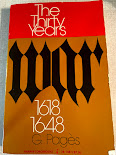May Reading Report
I have been trying to complete reading The Thirty Years War: 1618-1648. By Georges Pages. I finished it on May 22. I will now report on it. This book has been on my shelf for a long time. It is a Harper Torch book. I purchased bushels of those books over the years commonly at used book stores or sales. I can see dozens of them just by turning to my right. These are the kinds of volumes I would purchase thinking “I’m going to want to explore this topic one of these days.” Curiosity and breadth not only keeps a preacher from being boring it helps us to view the world from a much higher altitude than is typical. I chose to read this book now because I found that the intersection of Politics and Religion was timely. It is also essential to get historical perspective on these two topics while examining the tensions between them. When we are properly Kingdom focused we are better able to resist the allure of power and wealth offered by Empire. The Thirty-Years war is far enough removed to give us historical perspective whilst still exposing commonalities with our current era.
The Thirty-Years war is primarily thought of as a religious war. The last war in Europe between Catholicism and Protestantism. While the seeds of the conflict were sown in the struggle between the Reformation and the Counter-Reformation Pages does a good job of drilling down to the real issue. Power. Oddly enough the “hero” of the book is Cardinal Richelieu who rightly understood that the real issue was who was going to control the Germanys and through that control the rest of Europe.
So, though it seemed that the issue was between Catholic and Protestant, the evolution and outcome of the war came down to purely political alignments. In the end France fought Spain and the Holy Roman Empire (all three being Catholic) because Richelieu and his successors rightly understood that France could not afford to be surrounded by other great powers even if they shared the same faith allegiance.
In our era which consistently mistakes the role of Empire and Church this is the most important take-away. The Twenty-First century once again requires us to be clear in this distinction. Hiding nationalist, political, or economic self-interest in the language of faith does not sanctify it nor does it legitimize it. The Holy-Roman Empire’s central concern in Germany was property, power, and prestige. Even the Pope’s blessing could not make it otherwise. Spain may have sharpened its faith during the Reconquista but subduing the Bohemians in Bohemia was not the same thing as reclaiming their own territory. Faith may have given them cover but “there was gold in them there hills.”
Reading this book was tiresome. Physically it was published (as many Harper Torch Books were) on poor paper. Now yellowing, it was hard to read, particularly in poor light. This meant it took longer than it should have which was frustrating.
Next, being an older work in History it lacks much of the apparatus of historical analysis that we have come to expect. No maps. No tables. No charts. This is particularly problematic with respect to the political-geography of the Germanys which is the setting for much of the “action.” I can’t even get Scrivener (my word processor) to correctly deal with the proper way of writing what the Germanys then were. There was no Germany as we know it. The Holy Roman Empire of the German Nations (Peoples) encompassed more and less than our present geo-political reality. Every person who spoke German in central Europe; and many who did not. It was always more of an idea than anything else—wishful thinking really. So without both historical maps to follow the discussion and modern maps to bring things into contemporary context, it was often difficult to visualize what was happening where. There was information which would have been better summarized in tables and helpfully illustrated with graphs but those instruments were not exploited as they should have been.
A final aggravation, specifically because this was a book about a war, was the lack of detailed tactical information. Time and again a battle was mentioned as being central, emblematic, or critical—and that was it, just a mention. I was constantly firing up my phone and looking up the details of battles so I understood why something he called critical, was critical.
Towards the end of the book the author refused to grab the low-hanging fruit and discuss the total devastation of the Germanys during the course of the war. Some areas lost 70% of their pre-war population. Armies of all combatant nations marched across the German countryside debauching, destroying, depopulating. Pages mentioned that the peasants were just as poor afterwards, but not in constant fear of unprovoked attack.
Despite these criticisms the book was helpful. If you can find it I would recommend you grit your teeth and read it. We always think that our time is different. We think our motivations are purer, or clearer, or nobler than those who came before us. Yet, when we examine a clearly demarcated historical period, the scales come off of our eyes and we realize that there really is nothing new under the sun.



